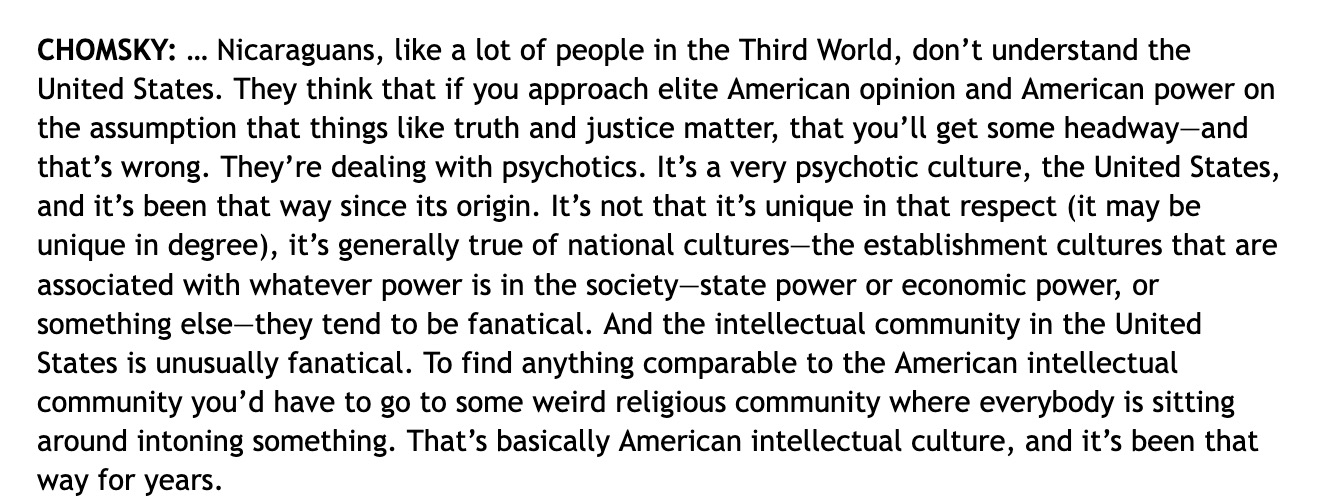this post was submitted on 24 Dec 2023
88 points (97.8% liked)
GenZedong
4298 readers
162 users here now
This is a Dengist community in favor of Bashar al-Assad with no information that can lead to the arrest of Hillary Clinton, our fellow liberal and queen. This community is not ironic. We are Marxists-Leninists.
This community is for posts about Marxism and geopolitics (including shitposts to some extent). Serious posts can be posted here or in /c/GenZhou. Reactionary or ultra-leftist cringe posts belong in /c/shitreactionariessay or /c/shitultrassay respectively.
We have a Matrix homeserver and a Matrix space. See this thread for more information. If you believe the server may be down, check the status on status.elara.ws.
Rules:
- No bigotry, anti-communism, pro-imperialism or ultra-leftism (anti-AES)
- We support indigenous liberation as the primary contradiction in settler colonies like the US, Canada, Australia, New Zealand and Israel
- If you post an archived link (excluding archive.org), include the URL of the original article as well
- Unless it's an obvious shitpost, include relevant sources
- For articles behind paywalls, try to include the text in the post
- Mark all posts containing NSFW images as NSFW (including things like Nazi imagery)
founded 4 years ago
MODERATORS
you are viewing a single comment's thread
view the rest of the comments
view the rest of the comments

And also settler-colonial, which is a very important factor when it comes to culture in this sense.
Imperial Russia was also "settler". Everything east of Gorky was conquered from the natives and settled. In fact, conquest of Ural and siberia coincided with the European colonisation of Americas.
Yet from this basis the USSR came to be.
I'm not sure what point you're making here. Russian colonialism doesn't change the importance of settler-colonialism in general and specifically in the US. The USSR was built on a basis of national liberation, and not on the "Great Russian" identity which would be analogous to the US identity here.
Another difference is that the US is entirely settler colonial, a whole country founded solely by settlers, while the Russian empire's colonies were all still tied to the metropolitan core in western Russia. The US was created through a revolt of the most reactionary settlers that wanted autonomy from Britain. The path forward for North America is strictly decolonial.
While you say this I will add some points, Russian Tsars maintained a quasi federal attitude, large parts of central Asia remained Muslim and large parts of siberia had buddhists community. Though some ethnic cleansing had happened in the Caucasus. Dagestan had Muslim population for many centuries under Tsar . They also sided against the Ottoman empire . Tsar also didn't have racist ideological perversion as their backbone. Alexander Pushkin was a great Russian poet and he came from a black lineage. Tsar had no problem raising black persons from Africa as their own in the royal courts. Meanwhile Americans.... Ufff...
Your comment here is way too favorable to the tzar. There was plenty of racism against the non-Russian peoples in the empire. Plenty of pogroms and other horrors committed. The "Great Russians" were very chauvinistic in their attitude towards the other nationalities, and were very privileged in what positions they could occupy, for example. An important part of Bolshevik propaganda was fighting against racism and "Great Russian" chauvinism.
From Walter Rodney's 'The Russian Revolution: A View from the Third World':
Pushkin's ancestor was a curiosity gifted to Peter the Great.
Sort of a house slave treated well due to his rareness.
Russian servants would be treated worse due to there being a bigger supply of them (some would, though, instead of peasants become soldiers of his toy regiments and sometimes more).
Then at some point, yes, Peter, consistently with his other hobbies, decided to free him, make him an officer, put him in uniform etc, ultimately marrying him to a girl of noble descent and making him a noble himself, of course.
That's not quite the same as not being racist.
That's usually called genocide.
okay you are all right about it !